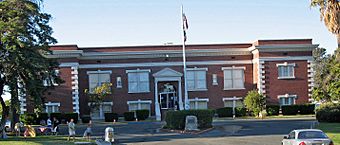Riverview Union High School Building facts for kids
Quick facts for kids |
|
|
Riverview Union High School Building
|
|
 |
|
| Location | 1500 W. 4th St., Antioch, California |
|---|---|
| Area | 2.8 acres (1.1 ha) |
| Architectural style | Late 19th and 20th Century Revival |
| NRHP reference No. | 98001243 |
| Added to NRHP | October 14, 1998 |
The Riverview Union High School Building is a very important historical place in Antioch, California. It was the very first high school ever built in Contra Costa County. This building has a long and interesting history, changing its purpose many times over the years. Today, it is home to the Antioch Historical Society.
Contents
A New School for Contra Costa
The Riverview Union High School first opened its doors on November 4, 1911. It was built at 1500 W First Street in Antioch. A generous person named Charles Appleton Hooper donated the land for the school. This helped solve a disagreement between the towns of Antioch and Pittsburg about where the school should be.
Students from many different towns, including Oakley and Pittsburg, came to learn at this high school. It served as an important center for education in the area for many years.
Life After the School
The last group of students graduated from Riverview Union High School in 1931. After that, a new high school was built on D Street in Antioch to take its place.
New Uses for the Building
Even after it stopped being a school, the building continued to be used.
- First, a government group called the Bureau of Reclamation used the building. They were working on a big water project called the Central Valley Project.
- In 1947, a company called Fibreboard Corporation bought the building. They used it for their research work.
- Later, in 1965, the Riverview Fire Protection District took over the building. They used it as their main office for many years.
A New Home for History
The fire department stopped using the building in 1994. Then, in 1999, the Antioch Historical Society bought the property. They now use the historic building as their home. This means the building continues to be an important part of Antioch's community and history.



